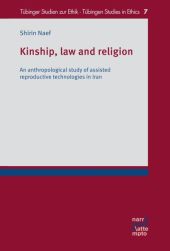 Neuerscheinungen 2017Stand: 2020-02-01 |
Schnellsuche
ISBN/Stichwort/Autor
|
Herderstraße 10
10625 Berlin
Tel.: 030 315 714 16
Fax 030 315 714 14
info@buchspektrum.de |

Shirin Naef
Kinship, law and religion
An anthropological study of assisted reproductive technologies in Iran
1. Auflage. 2017. 200 S. 220 mm
Verlag/Jahr: FRANCKE 2017
ISBN: 3-7720-8616-0 (3772086160)
Neue ISBN: 978-3-7720-8616-8 (9783772086168)
Preis und Lieferzeit: Bitte klicken
Since the first IVF birth in 1990, the Iranian medical community has not only given full support to the use and development of assisted reProductive technology but has aided the emergence of a powerful, locally-trained body of medical practitioners and biomedical researchers. At the same time, from a religious point of view, most Shia legal authorities - differences of opinion notwithstanding - have taken a relatively permissive view and generally support assisted reProductive technology, including procedures that involve egg, sperm and embryo donation as well as surrogacy arrangements under certain conditions. An examination of the social, legal and ethical aspects of the development and implementation of these technologies in Iran is the Subject of this book. It is based on a combination of extensive ethnographic research and textual analysis of important academic and religious seminary publications in Iran, from Shia jurisprudence (fiqh) and Persian histories to the analysis of laws and verdicts.
ACKNOWLEDGMENTS
Part I: Context
1. FRAMING THE ISSUES
Part II: Semantics
2. IDEAS ABOUT IRANIAN KINSHIP
3. SHIA APPROACHES TO ASSISTED REPRODUCTIVE TECHNOLOGIES
4. EMBRYO DONATION LAW AND SURROGACY REGULATION: THE INTERSECTION OF RELIGION, LAW AND ETHICS
Part III: Practice
5. SURROGACY AS DOING A GOOD DEED (SAVAB)
6. A PRICELESS GIFT: A SHORT STORY OF SURROGACY
7. "M AS IN MOTHER": MEDICAL PERSPECTIVES, CLINICAL ENVIRONMENTS AND SOCIAL DYNAMICS
8. COUSIN MARRIAGE, SIBLINGSHIP AND REPRODUCTIVE TECHNOLOGIES
9. CONCLUSION
APPENDIX
GLOSSARY
BIBLIOGRAPHY
Since the first IVF birth in 1990, the Iranian medical community has not only given full support to the use and development of assisted reproductive technology but has aided the emergence of a powerful, locally-trained body of medical practitioners and biomedical researchers. At the same time, from a religious point of view, most Shia legal authorities differences of opinion notwithstanding have taken a relatively permissive view and generally support assisted reproductive technology, including procedures that involve egg, sperm and embryo donation as well as surrogacy arrangements under certain conditions. An examination of the social, legal and ethical aspects of the development and implementation of these technologies in Iran is the subject of this book. It is based on a combination of extensive ethnographic research and textual analysis of important academic and religious seminary publications in Iran, from Shia jurisprudence (fiqh) and Persian histories to the analysis of laws and verdicts.


